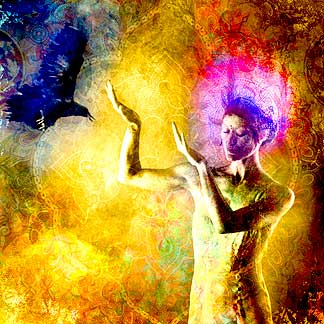
| What is Spirituality? It is my firm personal belief that we are all spiritual beings. We certainly may have different definitions for spirituality, but I don’t think many would disagree that we are more than mechanical machines that live out each day no differently in our purpose and function than a car or a computer. We love, and seek love, this alone is a spiritual pursuit, and most of us, if not all of us, understand what wanting to give and receive love is all about. Love is not measurable, nor can be seen or accurately described as it transcends the materialistic view of the universe. Love is only one example of this transcendent perspective of being human. Other examples may include what happens when we see an exquisite example of beauty, or hear music we find to be magnificent. |
||
 |
This is what I mean by spirituality—it is not religion, nor is it even a belief in or a relationship with God or a supreme force or being, although religious concepts and the belief in an all encompassing entity certainly can fit in the broad definition of spirituality. Transpersonal Psychology, as the fundamental core of my practice, focuses on this basic truth. Our life, if it were not spiritual, would not be livable as we would have no way to begin to understand it, nor would we care to. If you are not a religious person, or would not call yourself a spiritual person, my style of therapy would still probably appeal to your senses and your special way of looking at the world. I will say again, if you have not already read this several times in this website, I am not interested in forcing any sort of belief system onto my clients. I respect all cultures and all sorts of religions and unique ways of looking at the world. |
|
| One aspect of my way of relating that may seem firm and dogmatic is my insistence on seeing every individual with deep respect and with a firm commitment to attempt to understand them and their view of the world. I am a humanistic therapist, a transpersonal psychologist, believing that a sense of unconditional personal regard for my clients is a clear requirement in creating a positive and therapeutic relationship with them. It does not seem possible to me that there would be very many people, if any, that would find this offensive or contrary to their desire in a therapy relationship. So what is, then, spiritual counselling? Spiritual counselling is present in all of my work with clients. Sometimes, however, it is not as obvious as other times, and sometimes a client may not even notice that the central tenet of my therapeutic practice is transpersonal. Sometimes it is not even necessary to look beyond the practical day-to-day struggle with living to make therapy effective. Many reasons for coming into therapy may simply need more cognitive behavioral techniques in order to find relief. Many couples’ issues are quelled with more directive and pragmatic tools in communication, parenting, sexual issues, money issues, etc. Spirituality may not enter the obvious picture at all—or at least not consciously. I certainly do not have an agenda of any kind with clients, except to facilitate the pursuit of the desire they may have for positive change in their life. |
||
| However, there are many who are seeking better spiritual awareness directly. For those, there is a more subjective approach to therapy and counselling that covers a variety of inquisitions. Dream work, Sandtray therapy, music therapy, depth psychological work, hypnotherapy, and specifically spiritual and transpersonal explorations, exercises, and experiential awareness, all become very useful tools in exploring one’s personal and individual quest for meaning in life. I am well versed in these areas as I myself have been on a similar quest for a major part of my life and am aware of many of the methods used to nurture a greater understanding of our spiritual selves, the spiritual soul of the collective, as well as of the universe itself. Again, it is not a dogmatic knowledge of ultimate Truth I am speaking of, as each person’s journey through the spiritual life is unique and very individual. But there are certainly ways and methods to support the personal inquisitiveness of each person, and better their awareness of the secrets and treasures that lie within them. |
 |
|








